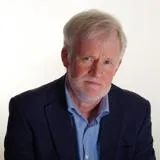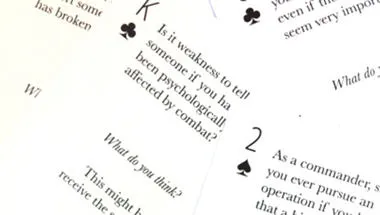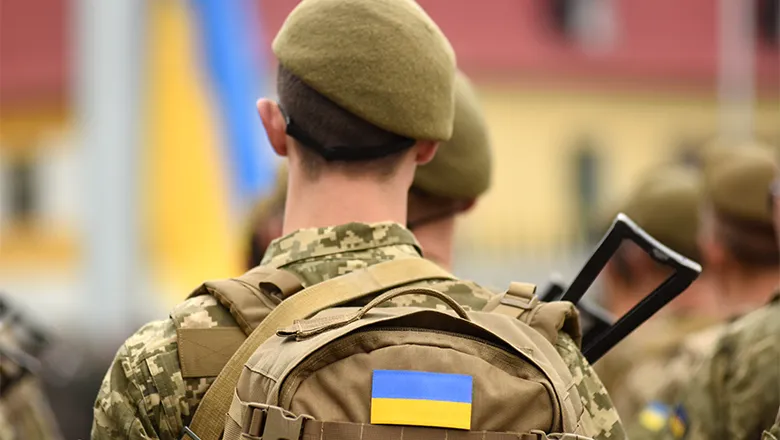
Dr Rod Thornton
Reader in Russian Defence and Security Studies
Research interests
- Conflict
- Security
Contact details
Biography
Dr Rod Thornton specialises in the study of the Russian military. He looks at this military as a holistic entity – from how its arms of service conduct kinetic warfare to how it engages in sub-threshold warfare activities.
He originally served for nine years in an infantry regiment of the British Army (1980-88). During his time, he spent four years in Germany and three years in Northern Ireland. He left the Army to go to university in 1988. After a degree in Russian and Serbo-Croat, he subsequently rejoined the Army to serve as an interpreter in Bosnia for a year (1992-93). He was one of only 13 British soldiers based in Sarajevo (Old Town) during the siege across the winter of 1992-1993. He left the Army again and began a career in academia after time spent living in both Moscow and Kiev (Kyiv). He went on to teach, firstly at King’s and then at the University of Nottingham and at the University of Hewler in Erbil, Kurdish Region of Iraq. He returned to King’s in 2013 when he was seconded to teach at the Qatari Staff College. Down the years, Rod has taught on a wide variety of topic areas – including international affairs, guerrilla warfare, counter-insurgency, terrorism, the Pakistan-Afghanistan region, Russian history and the history of the Middle East.
Research Interests
- The Russian armed forces
- Russian sub-threshold warfare
- Russian cyber capabilities
- UK homeland resilience
- Russian military high-tech systems
- Russian space capabilities
Along with a series of articles and book chapters, Rod has written a book entitled ‘Asymmetric Warfare’ with Polity Press (2007). He is currently working on a book about the Russian armed forces.
This encompasses the study of its army, navy and air force but also its activities in the sub-threshold space. Recently, Rod’s research concentration has been on Russian cyberspace operations. In light of Russian sub-threshold warfare activities, his research also encompasses homeland resilience capacity in the UK. He recently received a British Academy grant to look at UK homeland resilience capacity during the COVID-19 crisis.
Teaching
Rod teaches across a broad range of subject areas related to international affairs and defence and security issues. He is based at the UK Defence Academy, Shrivenham.
PhD students:
- Andrea Rebora (AI and cyber)
- Ewa Cholewa (Insurgents in Nigeria)
- Andrew Jensen (Russian and Chinese cyberspace operations)
- Keng Meng Tan (Offensive cyber)
- Muhammet Serif (Baltic States state resilience)
- Joe Cheravitch (Russian psychological warfare)
Dr Thornton is not in a position to accept more PhD students.
Recently Published
- ‘The UK view of AI and the future of warfare’. in Jungmi Cha (ed), Global AI Military Innovation and Future of Warfare How Global Military Powers Are Preparing for Future AI Warfare, National Assembly Futures Institute, Seoul, South Korea (ISBN: 979-11-94650-08-9(95340), February 2025. https://www.nafi.re.kr/english/research.do?mode=view&articleNo=9877
- And Marina Miron, ‘Russian military space-related capabilities: The vital deterrence role of counterspace weapons (Part II)’, Freeman Air and Space Institute (FASI) Paper, November 2024. ISSN 2754-0510. https://www.kcl.ac.uk/warstudies/assets/paper-26-rodthorntonmarina-miron-pt2-russian-military.pdf
- And Marina Miron, ‘Russian military adaptations in the Ukraine conflict (2022-?): dealing with the complexity of modern warfare’, in Pentti Forsstrom (ed), Russia’s War against Ukraine. Complexity of Contemporary Clausewitzian War, Series 2, No. 33, Finnish National Defence University, Department of Warfare, Helsinki, October 2024. (ISBN 978-951-25-3455-5). https://doria.fi/handle/10024/189938
- And Marina Miron, ‘The use of cyber tools by the Russian military: lessons from the war against Ukraine and a warning for NATO?’, in Applied Cybersecurity & Internet Governance, Vol. 3, No. 1 (2024). DOI: https://doi.org/10.60097/ACIG/190142. https://www.acigjournal.com/The-Use-of-Cyber-Tools-by-the-Russian-Military-Lessons-from-the-War-against-Ukraine,190142,0,2.html
- ‘Russian Cyber Operations in Ukraine: threat and response’, in David V. Goie and Margaret W. Smith (eds), Great Power Cyber Competition. Competing and Winning in the Information Environment (L: Routledge, 2024.) ISBN: 978-1-032-54526-4
- And Marina Miron, ‘Russian military space-related capabilities: The vital deterrence role of counterspace weapons (Part I)’, Freeman Air and Space Institute (FASI) Paper, June 2024. (ISSN 2754 0510)
- And Marina Miron, ‘The Russian use of space and counterspace assets in the Ukraine war: An appraisal’ in Pentti Forsstrom (ed), War on Ukraine: Strategic and Operational Designs and Implementation, Finnish National Defence University, Helsinki, September 2023. https://urn.fi/URN:ISBN:978-951-25-3400-5; https://www.doria.fi/handle/10024/187854
Research

The Centre for Military Ethics
The Centre for Military Ethics fosters ethical awareness and decision making in military environments.

King's Cybersecurity Centre
An EPSRC-NCSC Academic Centre of Excellence in Cyber Security Research (ACE-CSR). It provides expertise on most areas of cyber security, it has a critical mass of researchers working on three main research themes and their interrelationship.

Cyber Security Research Group
CSRG promotes research into cyber security bringing together experts from diverse disciplines.

Environmental Security research group
The Environmental Security research group brings together scholars from the security community and scholars working on issues of environmental security.

Freeman Air and Space Institute
Freeman Air & Space provides independent, original knowledge and analysis of air and space power issues.
News
King's continues to share crucial insights on the war in Ukraine
As the war in Ukraine enters its third year, academics from across the School of Security Studies at King’s College London continue to use their expertise to...

Features
Will the Ukraine war go nuclear?
ROD THORNTON & MARINA MIRON: Is there a risk of nuclear war breaking out over the Ukraine crisis?

What are the chances of a "palace coup" in Moscow?
ROD THORNTON: With mounting Russian casualties and supposed ‘tip-offs’ to Ukraine, pressure on Putin is increasing.

What happens when the Russians' "two-day" war drags on?
ROD THORNTON AND MARINA MIRON: It seems that the Putin’s war in Ukraine was supposed to last just two days. The fact that it is still dragging on has...

Why the UK needs to rethink homeland resilience in the wake of Covid
Covid-19 has revealed UK civil defence to be weak and overly reliant on the armed forces

What Covid-19 reveals about the UK's capacity to deal with the changing character of warfare
Resilience capacity in the UK has withered substantially since the Cold War. National crises highlight the importance of building it back up again.

Informing the public debate on COVID-19
Academics from across the Faculty of Social Science & Public Policy are helping us all better understand the huge societal shifts created by the COVID-19...

Understanding the impacts on society of COVID-19
How the Faculty of Social Science & Public Policy is helping us understand the huge societal shifts created by the COVID-19 pandemic.

Research

The Centre for Military Ethics
The Centre for Military Ethics fosters ethical awareness and decision making in military environments.

King's Cybersecurity Centre
An EPSRC-NCSC Academic Centre of Excellence in Cyber Security Research (ACE-CSR). It provides expertise on most areas of cyber security, it has a critical mass of researchers working on three main research themes and their interrelationship.

Cyber Security Research Group
CSRG promotes research into cyber security bringing together experts from diverse disciplines.

Environmental Security research group
The Environmental Security research group brings together scholars from the security community and scholars working on issues of environmental security.

Freeman Air and Space Institute
Freeman Air & Space provides independent, original knowledge and analysis of air and space power issues.
News
King's continues to share crucial insights on the war in Ukraine
As the war in Ukraine enters its third year, academics from across the School of Security Studies at King’s College London continue to use their expertise to...

Features
Will the Ukraine war go nuclear?
ROD THORNTON & MARINA MIRON: Is there a risk of nuclear war breaking out over the Ukraine crisis?

What are the chances of a "palace coup" in Moscow?
ROD THORNTON: With mounting Russian casualties and supposed ‘tip-offs’ to Ukraine, pressure on Putin is increasing.

What happens when the Russians' "two-day" war drags on?
ROD THORNTON AND MARINA MIRON: It seems that the Putin’s war in Ukraine was supposed to last just two days. The fact that it is still dragging on has...

Why the UK needs to rethink homeland resilience in the wake of Covid
Covid-19 has revealed UK civil defence to be weak and overly reliant on the armed forces

What Covid-19 reveals about the UK's capacity to deal with the changing character of warfare
Resilience capacity in the UK has withered substantially since the Cold War. National crises highlight the importance of building it back up again.

Informing the public debate on COVID-19
Academics from across the Faculty of Social Science & Public Policy are helping us all better understand the huge societal shifts created by the COVID-19...

Understanding the impacts on society of COVID-19
How the Faculty of Social Science & Public Policy is helping us understand the huge societal shifts created by the COVID-19 pandemic.

